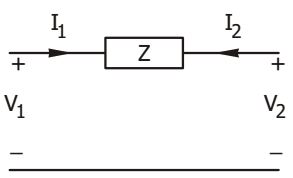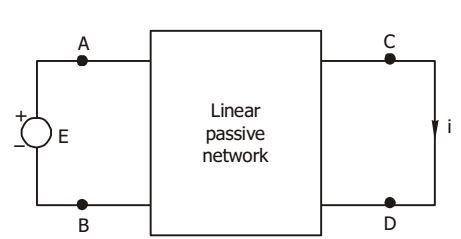Electric circuits miscellaneous
- z-matrix for the network shown in the given figure is

-
View Hint View Answer Discuss in Forum
From the circuit,
V1 = I 1 + (I 1 + I 2). 2s
= (2s + 1) I 1 + I 2 . 2sand V2 = 132 + (I1 + I2) 2s s = 2s I1 + I2 
2s + 3 
s 
Correct Option: A
From the circuit,
V1 = I 1 + (I 1 + I 2). 2s
= (2s + 1) I 1 + I 2 . 2sand V2 = 132 + (I1 + I2) 2s s = 2s I1 + I2 
2s + 3 
s 
- Which one of the following parameters does not exist for the two-port network shown in the given figure?

-
View Hint View Answer Discuss in Forum
Y-parameter = 1 
1 -1 
Z -1 1
and ∆y = 0
Then Z-parameter can not exist.Correct Option: C
Y-parameter = 1 
1 -1 
Z -1 1
and ∆y = 0
Then Z-parameter can not exist.
- For the circuit shown in the given figure, when the voltage E is 10 V, the current i is 1 A. If the applied voltage across terminal C-D is 100 V, the short circuit current flowing through the terminal A-B will be

-
View Hint View Answer Discuss in Forum
Using Y-parameter,
12 = Y21. VAB + Y22. VCD
When VAB = E = 10V,
I 2 = 1A, and VCD = 0
then Y21 = 0.1
When port 1 becomes port 2 and vice-versa,
then 12 = Y21. VCD + Y22. VAB
When VAB = 0, VCD = 100
then I2 = 0.1 × 100 = 10ACorrect Option: C
Using Y-parameter,
12 = Y21. VAB + Y22. VCD
When VAB = E = 10V,
I 2 = 1A, and VCD = 0
then Y21 = 0.1
When port 1 becomes port 2 and vice-versa,
then 12 = Y21. VCD + Y22. VAB
When VAB = 0, VCD = 100
then I2 = 0.1 × 100 = 10A
-
The driving point impedance Z(s) = s + 2 s + 2
The system is initially at rest. For a voltage signal of unit step, the current i (t) through the impedance Z is given by
-
View Hint View Answer Discuss in Forum
I(s) = (s + 3) s (s + 2) = 3 - 1 . 1 2s 2 s + 2 ∴ i(t) = 3 - 1 e-2t 2 2 Correct Option: C
I(s) = (s + 3) s (s + 2) = 3 - 1 . 1 2s 2 s + 2 ∴ i(t) = 3 - 1 e-2t 2 2
- The driving point impedance of the infinite ladder network shown in the figure is (Given : R1 = 2 Ω and R2 = 1.5 Ω)

-
View Hint View Answer Discuss in Forum
Req = R1 + (R1 + Req) R2 R1 + R2 + Req
⇒ Req. R1 + Req. R2 + Req 2 = R1 2 + R1 R2 + Req R1 + R1 R2 + Req . R2
⇒ Req = √R1 ² + 2 R1 R2
= √4 + 2 . 2 . 15
= √10 = 3.5 ΩCorrect Option: B
Req = R1 + (R1 + Req) R2 R1 + R2 + Req
⇒ Req. R1 + Req. R2 + Req 2 = R1 2 + R1 R2 + Req R1 + R1 R2 + Req . R2
⇒ Req = √R1 ² + 2 R1 R2
= √4 + 2 . 2 . 15
= √10 = 3.5 Ω

